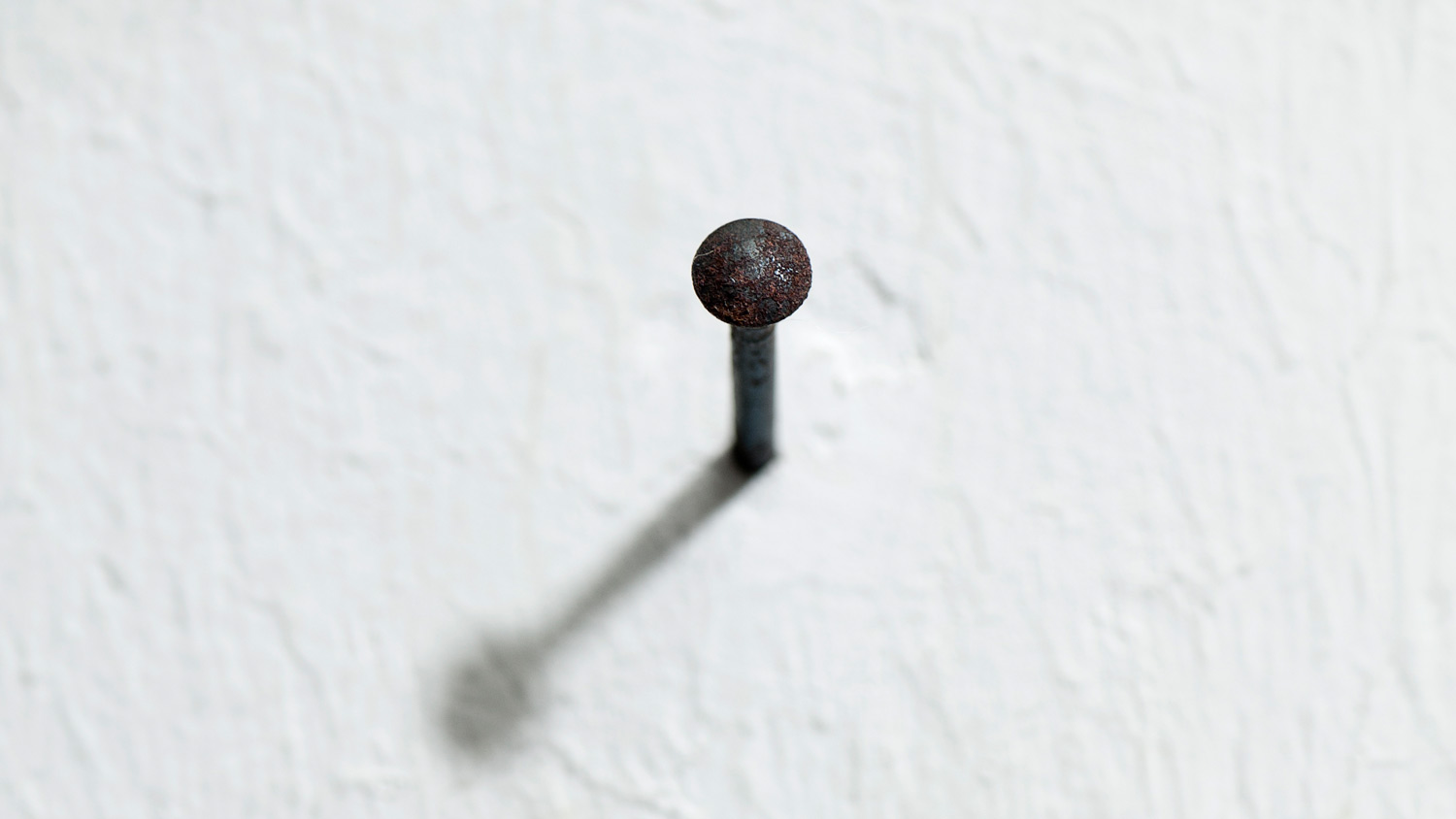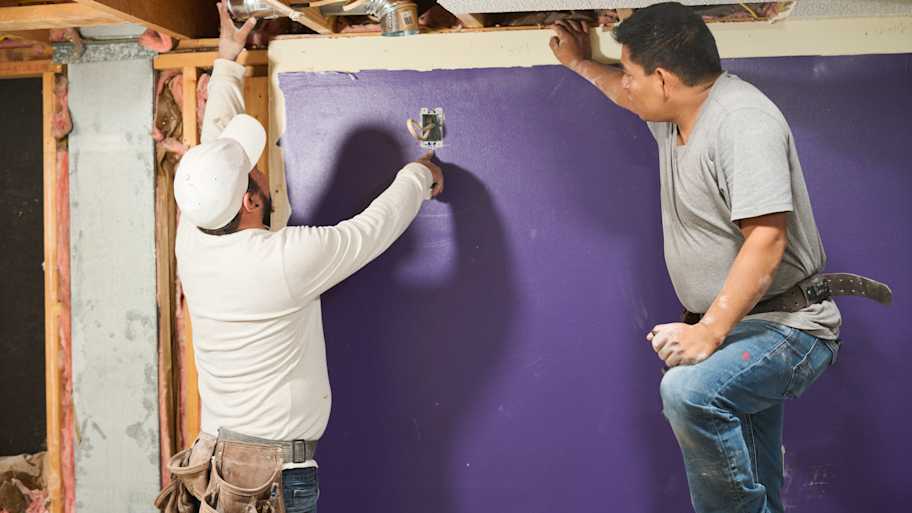What Size Drywall Screws Should I Use?
Size isn’t all that matters—there’s a lot to consider when choosing a screw


Most drywall projects use either #6 or #8 gauge screws.
The standard 1/2-inch-thick drywall requires 1 ¼- or 1 ⅝-inch screws.
Use a screw with coarse thread for wood and fine thread for metal.
Consider location, stud material, and drywall thickness when choosing a screw.
If you’re planning to install drywall, you’ll need to start learning a lot about screws. While the gauge (or thickness) of the screw is vitally important, you’ll also have to choose the right length and the right type of thread. The ideal combination will keep your drywall in place and help prevent pesky popped screws that will ruin your wall’s paint job. This guide will help you determine what size drywall screws to use, along with the ideal thread for every situation.
What Is the Standard Drywall Screw Size?
There are two measurements when it comes to drywall screw size: the gauge (or the thickness of the screw) and the length. On product labels, you’ll often find the gauge listed after the length. For example, a screw may be listed as 1 ¼ inch x 6, meaning it’s 1 ¼ inches long and has a #6 gauge.

Drywall screws come in standard sizes depending on the thickness of your drywall. Most residential drywall installations use drywall that is ½ inch thick, requiring standard drywall screws that are:
1 ¼ inches long with a #6 or #8 gauge
1 ⅝ inches long with a #6 or #8 gauge
When in doubt about which screws to use, ask a drywall contractor for guidance. Keep in mind that while these are the most common drywall nail sizes for home renovations, you may want to use other sizes. Let’s explore the specifics.
Drywall Screw Size by Gauge
Most residential drywall installations use a #6 or #8 gauge drywall screw. Screws with a #6 gauge have a thread diameter of roughly 3.5 millimeters. They’re slightly smaller than #8 screws, which have a thread diameter of roughly 4.2 millimeters. You’ll use either one in slightly different scenarios:
#6 screw: Use if your studs are new or in good condition
#8 screw: Use if your studs are made from older or damaged wood or you need extra grip on newer wood studs
Though you may be tempted to use wood screws in drywall, drywall screws are designed to secure drywall. They have a sharper point, which helps the screw pierce through the paper, and a bugle head, which keeps the screws in place without tearing the paper.
Drywall Screw Size by Length
Beyond gauge, you’ll also need to consider drywall screw length. For thicker drywall, you’ll use longer screws. Though a good drywall contractor will have the right type of screws on hand, here are some guidelines if you plan to DIY your drywall project:
½-inch drywall: This is the most common type of drywall in homes. Use 1 ¼-inch or 1 ⅝-inch screws. Some homeowners prefer to use the smaller size to avoid damaging metal studs.
¼-inch drywall: Thin drywall is sometimes used to skim walls and ceilings or to cover curved areas. Use 1-inch or 1 ¼-inch screws.
⅝-inch drywall: Fire code may require a slightly thicker drywall in certain areas of your home. Use ⅝-inch drywall in garages and walls near your furnace. This drywall thickness requires 1 ⅝-inch or 2-inch screws.
Once you find the right length screw, you’ll need the right amount. On average, you can expect to use 32 screws per sheet of drywall, but you’ll need more if you choose a large or extra-large sheet.
Types of Drywall Screw Threads

The type of thread is just as important as the sizing and ensures a strong hold without damaging the drywall or the stud. You’ll need to use different types of thread for wood or metal studs.
Coarse thread screws: Coarse thread screws (or W-type screws) work best to secure drywall to wood studs. The wider threads provide more grip on the wood grain.
Fine thread screws: Fine thread screws (or S-type screws) work best to secure drywall to metal studs. They’re self-threading and have sharp points that help grip the metal without damaging it. Coarse thread screws will essentially strip the screw holes as you try to screw them in.
Self-drilling screws: If you don’t want to drill pilot holes, you can use a self-drilling drywall screw. Self-drilling screws with a fine thread are best for metal studs or frames.
Trim-head screws: This type of screw attaches wood trim to drywall. The head is smaller and easier to conceal than the screws used to hang your drywall.
Even if you use screws with the ideal thread, you may want to glue your drywall for added security.
Choosing the Right Drywall Screw
A few factors impact what size drywall screws are best for your installation—but size isn’t the only thing that matters. You should also care about thread and coatings. To find the right fit, consider the materials, location, and thickness of your walls. Keep these factors in mind when choosing drywall screws, or hire a local drywall installer to handle your project from start to finish.
Drywall Thickness
To figure out what size screw to use, you’ll need to determine the thickness of your drywall. Screws that are too short won’t properly anchor the drywall, but screws that are too long can damage your stud.
You’ll find the thickness of the drywall on the sheet. If not, you can use a ruler or caliper against the edge of the drywall to determine the thickness. Most homeowners use drywall that’s ½ inches thick, but there are certain scenarios where you may choose an alternative size.
Stud Material
Studs are made from wood or metal. Each material responds best to a different type of thread. You also have a bit more leeway to switch up the gauge on a wood stud because the material is more forgiving. Here’s what you should use:
Wood stud: On a wood stud, you can use coarse thread screws with a #6 or #8 gauge. Use a #8 gauge when you want more hold, such as when the wood is older or damaged. Either is acceptable, and the choice is up to preference.
Metal stud: On metal studs, use fine thread screws with a #6 gauge. Thinner screws are less likely to damage the metal.
Drywall Location
Thanks to gravity, drywall located on your ceiling will need a screw with more grip than drywall on your walls. When choosing between two screw sizes, opt for the larger screw for ceilings. Assuming your drywall is ½ inch thick, the following chart shows ideal screw sizes.
Coating
Drywall screws can have a coating to help prevent corrosion. For most interior applications, homeowners can use phosphate-coated drywall screws, which are black in color. If you’re installing drywall in an area that experiences high levels of moisture and humidity, you can choose zinc-coated drywall screws.
Drywall Nails vs. Drywall Screws
| Location | Thread | Size |
|---|---|---|
| Wall (wood stud) | Coarse | 1 ¼ inch x 6 or 8 |
| Wall (metal stud) | Fine | 1 ¼ inch x 6 |
| Ceiling | Coarse | 1 ⅝ inch x 6 or 8 |
You may be wondering: What about drywall nails, though? Hanging your drywall with nails or screws is a hotly debated topic. Every contractor and DIYer swears by their own method, but each has pros and cons.
Drywall Screws
Drywall screws are the most secure method of drywall installation. The thread gives them extra grip that prevents them from popping out and ruining the look of your drywall, though they can break during installation. They’re a bit harder to hide during the finishing stage, but the effort is worth it if you know what you’re doing.
| Pros | Cons |
|---|---|
| Sturdier than nails | More difficult to hide |
| Excellent grip strength | Higher cost |
| Won’t damage drywall | Requires longer, more careful installation |
Drywall Nails
Drywall nails are quicker to install and easier to hide, making them a popular choice among DIYers. That said, they’re more likely to pop out or move. You can also damage your drywall with your hammer if you don’t know what you’re doing.
Even though nails cost less, you’ll need to purchase some additional tools for drywall installation, including a nail gun. In comparison, screw installation only requires a standard toolkit.
















